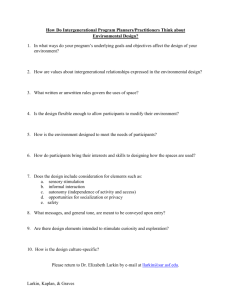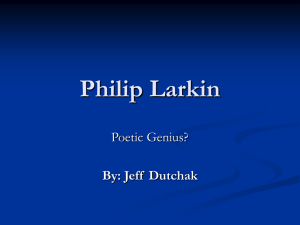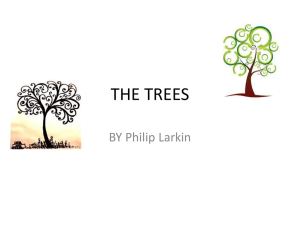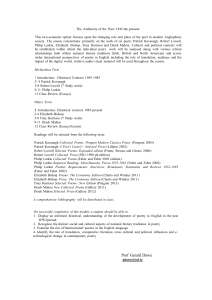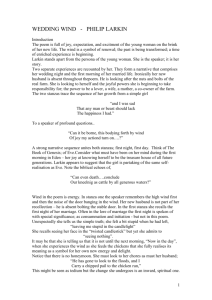poem - MFI
advertisement
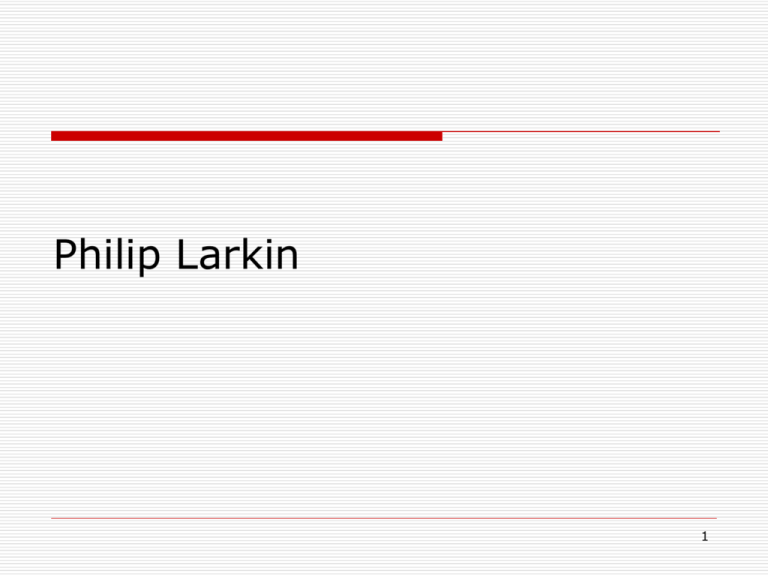
Philip Larkin 1 Philip Larkin (1922-1985) 2 Larkin the Librarian 3 Life Was born in Coventry, studied at Oxford during WWII. Worked as a librarian in Belfast from 1950. Moved to Hull in 1955: Librarian of Brynmor Jones Library. Publishing jazz reviews in the Daily Telegraph. Offered Poet Laureateship, 1984, refused to accept. Gravestone: Philip Larkin 1922-1985. Writer. 4 ‘What are days for? Days are where we live. They come, they wake us Time and time over. They are to be happy in: Where can we live but days?’ 5 Work The North Ship, 1945. Jill, 1946. A Girl in Winter, 1947. The Less Deceived, 1955. The Whitsun Weddings, 1964. The Oxford Book of Twentieth Century Verse, 1973. Editor. High Windows, 1974. Required Writing, 1983. Collected Poems, 1988. Ed. Anthony Thwaite 6 Themes and features Silence and breaking of silence. Oblivion and fighting against oblivion: ‘I write poems to preserve things…both for myself and for others…to keep things from oblivion’ (RW). Dramatic monologues. Larkin’s persona: a depressed, elderly, disappointed, alienated man. ‘The great thing is not to be different from other people but be different from yourself’ (RW). ‘The less deceived position.’ Pessimism. Traces of Romanticism. Anti-modernism. 7 The Movement New Lines ed. by Robert Conquest (1956). Philip Larkin: a spokesman for a generation that was turning its back on modernism. ‘Larkin took these reactions and made theme respectable, by showing that the alternative tradition, that of Hardy and Edward Thomas, still had life in it’ (LucieSmith). Larkin defined the main principles of Movement poetry as ‘new Augustan literature’ (referring to the 18th c.). 8 Main features Reaction against the poetry of Dylan Thomas. Sparing use of images. Lucid, technical, smooth style. Defined themselves in opposition to the Thirties poets. Valued the period before WWI. Political neutralism - later replaced by conservatism. Anti-romantic attitude. Poems are associated with one particular experience or a concrete situation. Epiphany: a moment of sudden illumination. ‘Creative photography’. It was not a cohesive movement or school, didn’t have a leading figure (as e.g. T.S. Eliot of Modernism). Larkin is seen in the centre but he was not a leader. 9 Main features (cont) Anti-romantic attitude. Poems are associated with one particular experience or a concrete situation. Epiphany: a moment of sudden illumination. Not a cohesive movement or school. Larkin is seen in the centre but he was not a leader. 10 This Be the Verse They fuck you up, your mum and dad. They may not mean to, but they do. They fill you with the faults they had And add some extra, just for you. 11 But they were fucked up in their turn By fools in old-style hats and coats, Who half the time were soppy-stern And half at one another's throats. Man hands on misery to man. It deepens like a coastal shelf. Get out as early as you can, And don't have any kids yourself. 12 Discussion Style and tone? What makes it ‘a poem’? Pessimistic conclusion? Meaning of the title? 13 The ‘less deceived’ position ‘…we think that we can expel our hidden and continual grief through the society of others and through a manifold variety of pleasures. But we are only too deceived. […] But while we are deceived, usually those are less deceived who at some time […] become suspicious and say to themselves: Perhaps those things are not true which now appear to us: perhaps we are now dreaming.’ (Marsilio Ficino, 16th c.) 14 The ‘less deceived’ position Hamlet: I did love you once. Ophelia:You made me believe so. Hamlet: You should have not believed me… I loved you not. Ophelia: I was the more deceived. (III. 2.) 15 Worksheet Philip Larkin has been accused of lack of sympathy. Just how fair is this criticism? Support your opinion with quotations from the poems. 16 The Old Fools What do they think has happened, the old fools, To make them like this? Do they somehow suppose It's more grown-up when your mouth hangs open and drools, And you keep on pissing yourself, and can't remember Who called this morning? Or that, if they only chose, They could alter things back to when they danced all night, Or went to their wedding, or sloped arms some September? Or do they fancy there's really been no change, And they've always behaved as if they were crippled or tight, Or sat through days of thin continuous dreaming Watching light move? If they don't (and they can't), it's strange: Why aren't they screaming? 17 ‘Do not go gentle into that good night’ (Dylan Thomas) Do not go gentle into that good night, Old age should burn and rave at close of day; Rage, rage against the dying of the light. Though wise men at their end know dark is right, Because their words had forked no lightning they Do not go gentle into that good night. 18 Worksheet Find a definition of the term dramatic monologue, point out its main features, and apply it to one of Philip Larkin’s poems 19 Dramatic monologue A poem in which a single person, not the poet, is speaking. (Wordsworth, Browning, Tennyson, Eliot, Yeats) The expressed ideas are not necessarily those of the poet. Creates a distance between the writer and the reader. Assumes a listener. Involves a dramatic situation: setting, characters, conflict. Gradually unfolds the dramatic situation. The voice may speak to another fictitious character or may address the implied reader. 20 Related terms Soliloquy: a part of a play where a character speaks directly to the audience. (One character present on the stage.) Monologue: a part of a play when a single person is speaking to another character (one half of a dialogue). (Two characters present on the stage.) 21 Related terms (cont) Speaker: the lyrical I in the poem, the first person singular, the voice speaking. Persona: (Lat.) ‘theatrical mask’. The point of view of a person that is not the author. (Might be an object, an animal as well as a real or fictitious human being.) 22 Worksheet Read the poem Church Going and think about the dramatic situation, try to describe the speaker and his relationship to the building in paticular and to religion in general, and trace the change of his attitude throughout the poem. 23 Church Going Once I am sure there's nothing going on I step inside, letting the door thud shut. Another church: matting, seats, and stone, And little books; sprawlings of flowers, cut For Sunday, brownish now; some brass and stuff Up at the holy end; the small neat organ; And a tense, musty, unignorable silence, Brewed God knows how long. Hatless, I take off My cycle-clips in awkward reverence. Move forward, run my hand around the font. From where I stand, the roof looks almost new – Cleaned, or restored? Someone would know: I don't. Mounting the lectern, I peruse a few Hectoring large-scale verses, and pronounce 'Here endeth' much more loudly than I'd meant. The echoes snigger briefly. Back at the door I sign the book, donate an Irish sixpence, Reflect the place was not worth stopping for. 24 Yet stop I did: in fact I often do, And always end much at a loss like this, Wondering what to look for; wondering, too, When churches will fall completely out of use What we shall turn them into, if we shall keep A few cathedrals chronically on show, Their parchment, plate and pyx in locked cases, And let the rest rent-free to rain and sheep. Shall we avoid them as unlucky places? Or, after dark, will dubious women come To make their children touch a particular stone; Pick simples for a cancer; or on some Advised night see walking a dead one? Power of some sort will go on In games, in riddles, seemingly at random; But superstition, like belief, must die, And what remains when disbelief has gone? Grass, weedy pavement, brambles, buttress, sky, 25 A shape less recognisable each week, A purpose more obscure. I wonder who Will be the last, the very last, to seek This place for what it was; one of the crew That tap and jot and know what rood-lofts were? Some ruin-bibber, randy for antique, Or Christmas-addict, counting on a whiff Of gown-and-bands and organ-pipes and myrrh? Or will he be my representative, Bored, uninformed, knowing the ghostly silt Dispersed, yet tending to this cross of ground Through suburb scrub because it held unspilt So long and equably what since is found Only in separation - marriage, and birth, And death, and thoughts of these - for which was built This special shell? For, though I've no idea What this accoutred frowsty barn is worth, It pleases me to stand in silence here; 26 A serious house on serious earth it is, In whose blent air all our compulsions meet, Are recognized, and robed as destinies. And that much never can be obsolete, Since someone will forever be surprising A hunger in himself to be more serious, And gravitating with it to this ground, Which, he once heard, was proper to grow wise in, If only that so many dead lie round. 27 Dramatic monologue Situation Speaker Conflict 28 Structure Description of a situation Argument about conflicting opinions Conclusion 29 Worksheet Find a definition of the term epiphany and illustrate it with one of Larkin’s poems. 30 Epiphany Gk. ‘manifestation’ Originally: manifestation of Christ before the Three Wise Men, celebrated on 6th January Literature: any sudden moment of insight or revelation of a hidden (mainyl spiritual) truth James Joyce 31 The Arundel Tomb, Chichester Cathedral 32 An Arundel Tomb Side by side, their faces blurred, The earl and countess lie in stone, Their proper habits vaguely shown As jointed armour, stiffened pleat, And that faint hint of the absurd The little dogs under their feet. Such plainness of the pre-baroque Hardly involves the eye, until It meets his left-hand gauntlet, still Clasped empty in the other; and One sees, with a sharp tender shock, His hand withdrawn, holding her hand. 33 They would not think to lie so long. Such faithfulness in effigy Was just a detail friends would see: A sculptor's sweet commissioned grace Thrown off in helping to prolong The Latin names around the base. They would no guess how early in Their supine stationary voyage The air would change to soundless damage, Turn the old tenantry away; How soon succeeding eyes begin To look, not read. Rigidly they 34 Persisted, linked, through lengths and breadths Of time. Snow fell, undated. Light Each summer thronged the grass. A bright Litter of birdcalls strewed the same Bone-littered ground. And up the paths The endless altered people came, Washing at their identity. Now, helpless in the hollow of An unarmorial age, a trough Of smoke in slow suspended skeins Above their scrap of history, Only an attitude remains: 35 Time has transfigured them into Untruth. The stone fidelity They hardly meant has come to be Their final blazon, and to prove Our almost-instinct almost true: What will survive of us is love. 36 Dramatic monologue Situation Speaker Conflict 37 Structure Description of a situation Argument about conflicting opinions Epiphany? Conclusion 38 The Arundel Tomb, Chichester Cathedral 39
